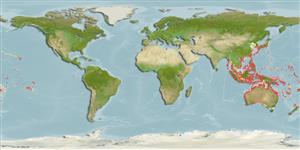Common names from other countries
分类 / Names
俗名 | 同种异名 | Catalog of Fishes(属, 种) | ITIS | CoL | WoRMS | Cloffa
Teleostei >
Elopiformes (Tarpons and tenpounders) >
Elopidae (Tenpounders)
Etymology: Elops: Greek, ellops = a kind of serpent (Ref. 45335).
More on author: Regan.
Environment: milieu / climate zone / depth range / distribution range
生态学
海洋; 淡水; 半咸淡水; 溯河洄游 (Ref. 51243); 深度上下限 1 - 30 m (Ref. 6898). 熱帶; 41°N - 40°S, 92°E - 138°W
Indo-Pacific: from the Andaman Sea in the Eastern Indian Ocean to Western Australia and in the Pacific, from southern Japan to New South Wales and New Caledonia; throughout most of Oceania to the Hawaiian Is., Society Is., and Tuamotus (Ref. 86689). Currently treated as a single species, but this status should be considered provisional. Further studies may reveal a complex of closely related species, as in the case of Albula.
印度-太平洋: 在中西太平洋各處。 現在視為了一個種,但是這狀態應該被認為暫時的。 更進一步的研究可能顯示一個近親魚種的複合體,與 Albula 相同情況。
大小 / 重量 / 年龄
Maturity: Lm ? range ? - ? cm
Max length : 120 cm SL 雄鱼/尚未辨别雌雄; (Ref. 44894); common length : 50.0 cm SL 雄鱼/尚未辨别雌雄; (Ref. 10983); 最大体重: 10.1 kg (Ref. 6736)
背棘 (总数) : 0; 背的软条 (总数) : 23 - 27; 臀棘: 0; 臀鳍软条: 14 - 18. A gular plate present between arms of lower jaw. Branchiostegal rays numerous, approximately 20-25. All fins without spines. Scales very small, approximately 100 in lateral line.
一个喉盘在下颌臂之间呈现。 鳃条骨很多的, 大约 20-25. 没有棘的所有的鳍。 鳞片非常小的, 大约 100 在侧线中。
A coastal fish, commonly entering lagoon, bays, and estuaries (including fishponds) (Ref. 2847, 58302), particularly around mangroves (Ref. 44894). Sometimes enters freshwater streams, but does not penetrate very far inland (Ref. 2847). Benthopelagic (Ref. 58302). Younger fish often penetrate the lower freshwater reaches of rivers (Ref. 44894). An active swimmer, commonly traveling in schools in open water. Feeds on various fishes and crustaceans. Little detailed knowledge exists of its biology. Has a leptocephalus larva. Spawning takes place offshore and young larvae are found in the open sea, moving close to shore as they develop. Juveniles commonly found in salt marshes, canals, and tidal streams. Marketed fresh or frozen; in some places ground up as fish meal. A good sport fish on light tackle, striking a variety of artificial lures as well as live shrimp or baitfish. No separate statistics available. (Ref. 10983).
一个海岸的鱼, 通常进入舄湖,海湾与河口 (包括鱼池)(参考文献 2847), 特别地红树林的周围.(参考文献 44894) 有时进入淡水溪流, 但是不会非常远在内陆深入.(参考文献 2847) 较年轻的鱼时常深入河的下面淡水范围。 (参考文献 44894) 一位活跃的游泳者, 通常移动在群游于开放水域。 吃各种不同的鱼与甲壳动物。 它的生物学特性详细知识存在不多。 有一个狭首型幼鱼幼体。 产卵发生外海与幼鱼仔鱼被发现于开放海域,当他们发育的时候,移动接近海岸。 稚鱼普遍发现于含盐的湿地,管與潮汐的溪流。 生鮮或冷凍地在市場上銷售; 在一些地方地面中提高如魚粉。 在被顯著的多種人造的餌的輕型漁具上的一個好垂釣用魚以及生活蝦或誘餌魚。 缺乏有用的個別統計資料。 (參考文獻 10983).
Life cycle and mating behavior
Maturities | 繁殖 | Spawnings | Egg(s) | Fecundities | 仔鱼
印度-太平洋: 在中西太平洋各處。 現在視為了一個種,但是這狀態應該被認為暫時的。 更進一步的研究可能顯示一個近親魚種的複合體,與 Albula 相同情況。
Smith, D.G., 1997. Elopidae. Ladyfishes, tenpounders. p. 1619-1620. In K.E. Carpenter and V.H. Niem (eds.) FAO species identification guide for fishery purposes. The living marine resources of the WCP. Vol. 3. Batoid fishes, chimaeras and bony fishes part 1 (Elopidae to Linophrynidae). FAO, Rome. (Ref. 10983)
CITES (Ref. 128078)
Not Evaluated
人类利用
渔业: 商业性; 游钓鱼种: 是的
工具
特别资料
下载 XML
网络资源
Estimates based on models
Preferred temperature (Ref.
115969): 24.5 - 29.3, mean 28.6 (based on 2710 cells).
Phylogenetic diversity index (Ref.
82804): PD
50 = 0.5176 [Uniqueness, from 0.5 = low to 2.0 = high].
Bayesian length-weight: a=0.00589 (0.00256 - 0.01357), b=2.99 (2.79 - 3.19), in cm Total Length, based on LWR estimates for this (Sub)family-body shape (Ref.
93245).
营养阶层 (Ref.
69278): 4.0 ±0.62 se; based on food items.
Fishing Vulnerability (Ref.
59153): Very high vulnerability (88 of 100).
